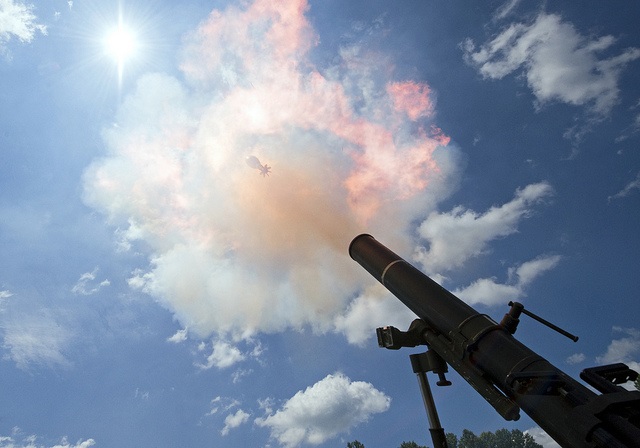ASPI suggests
 Kicking us off, War is Boring carries a piece on the ‘distressing and predictable’ effect of mortars used by state and non-state forces in Africa and the Middle East. Data collected over three years indicated that 92% of mortar casualties were non-combatants. Foreign Policy has detailed reporting on the civilian casualties of air strikes conducted by the US and its 11 allies in Iraq and Syria.
Kicking us off, War is Boring carries a piece on the ‘distressing and predictable’ effect of mortars used by state and non-state forces in Africa and the Middle East. Data collected over three years indicated that 92% of mortar casualties were non-combatants. Foreign Policy has detailed reporting on the civilian casualties of air strikes conducted by the US and its 11 allies in Iraq and Syria.
Pacific Forum CSIS has this week released two analyses on the Asia–Pacific. Ralph Cossa and Brad Glosserman explore the competing narratives of American and Chinese power (and perceptions of that power) in the region. David Santoro and Carl Baker identify nuclear governance as the next important Asian project in light of plans to significantly increase the quantum of nuclear power plants—and thus nuclear materials—in the Asia–Pacific. ‘This is worrisome’, they note, ‘for a region that hosts several nuclear-armed states, has been involved in illicit trafficking networks, and continues to experience significant terrorist, insurgent, and pirate activity’.
An increasingly confident Indian foreign policy under PM Narendra Modi has given rise to some compelling commentary. Shashank Joshi looks at India’s contributions to nuclear order in the Asia–Pacific on the back of a recent report from the Council on Foreign Relations. Over at The Interpreter, Joshi assesses Indian enthusiasm for the rumoured next US defence chief Ashton Carter. Modi’s maritime doctrine was the focus of a piece from the Delhi-based Institute of Peace and Conflict Studies and of one at The Diplomat.
Writing for The National Interest, Patrick Cronin says it’s time for China’s coercive and assertive behaviour to be met with costs that dissuade repeat performances and compel cooperation. He outlines a range of military and non-military cost-imposition strategies.
Add defence budget woes as the latest patch of common ground for relations between the US and Australia. Defense One reports on the US Navy’s calls for a budget boost in anticipation of a shipbuilding project to replace their 14 Ohio-class ballistic missile submarines to be retired from 2027. Defence force salary has been up for discussion here as well across the Pacific, with President Obama to use his executive authority to set a 1% pay rise for the US military next year, instead of the 1.8% boost that would’ve otherwise been applied under the annual cost-of-living adjustment. With lessons for all defence organisations, a new PwC report looks at the challenges of maintaining of an agile force posture in the face of resource stringency.
Over at the Parliamentary Library’s FlagPost blog, Nigel Brew wades through some of the estimates provided for the cost of the data retention scheme proposed in the government’s third tranche of national security legislation. Although now we have the Bill and the draft data set, the cost of the scheme and who will foot the bill remain unknown. After a successful motion was moved by Senator Scott Ludlam, the Attorney-General was ordered to produce the summarised findings or a redacted version of a report compiled for the government by PwC on the cost of the data retention scheme by noon yesterday. A letter from the Attorney-General was tabled today out of sitting in which he stated that he was not in a position to comply on the grounds that it ‘would reveal a cabinet deliberation’.
Lastly, Kalashnikov Concern, maker of the AK-47, has this week revealed its fresh branding at an event in Moscow. With over 100 million AK-47’s in circulation, it’s a challenge to reconcile the brand’s new slogan–‘protecting peace’ or ‘weapons of peace’–with the pervasiveness of their product in conflicts large and small since 1947.
Video
Vice News and the New York Review of Books continue their Talking Heads series, this week exploring ‘how the US created the Islamic State’. Mark Danner discusses his 2003 NYRB essay, Iraq: The New War, in which he outlined how US policy in Iraq was inciting an insurgency–one that has since evolved to become the Islamic State. The video is here; Danner’s essay is here.
Podcast
Lawrence Freedman delivered a speech on strategy (and strategists) at a recent conference on US-UK relations in the context of grand strategy. War on the Rocks has the keynote.
Events
Canberra, Tuesday 9 December: For those of you who missed out on a ticket to the next Women in Defence and Security Network event, the School of International, Political and Strategic Studies at the ANU has come to your rescue. IPS will host Clive Williams for a War Studies Seminar on the 1963 battle for Ap Bac in South Vietnam and why it remains relevant in the face of Australia’s support for US war efforts in Afghanistan and Iraq. Register online.
David Lang is an analyst at ASPI and an editor of The Strategist. Image courtesy of Flickr user The U.S. Army.